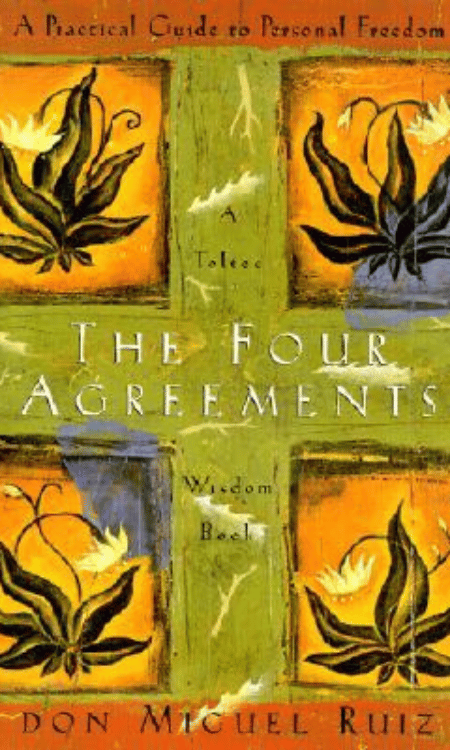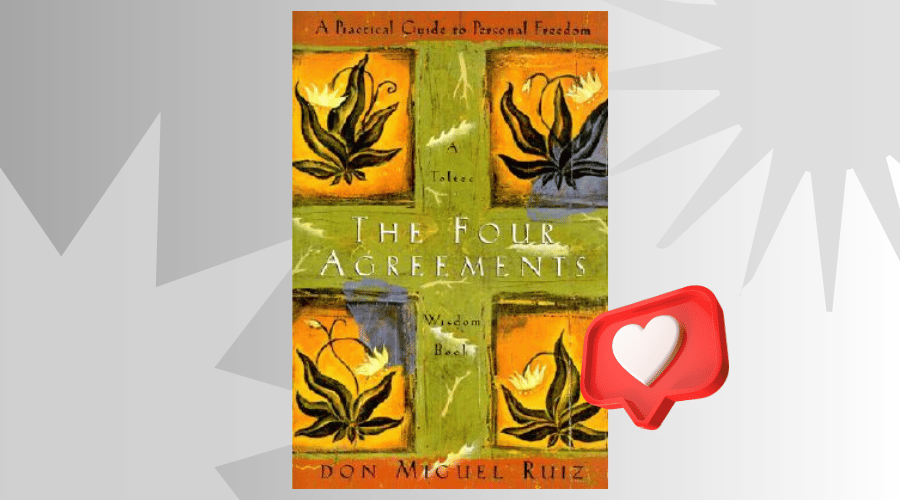The Four Agreements by Don Miguel Ruiz is a short but powerful guide to personal freedom and happiness, inspired by ancient Toltec wisdom. With its four principles—be impeccable with your word, don’t take things personally, avoid making assumptions, and always do your best—the book offers straightforward, actionable advice for leading a more peaceful and authentic life. Its simplicity makes it easy to understand, but the ideas go deep, encouraging readers to shift their mindset and improve their relationships with others and themselves.

| Author | Miguel Ruiz |
| Publication date | January 1, 1997 |
| Goodreads Rating | 4.19 |
| Pages | 152 |
| ISBN | 1878424505 |
| Topics | Self Help, Nonfiction, Spirituality, Philosophy, Personal Development, Psychology, Inspirational, Business, Mental Health |
The Four Agreements Summary
The Four Agreements by Don Miguel Ruiz is all about achieving personal freedom and happiness through four guiding principles. Here’s a quick breakdown:
- Be Impeccable with Your Word. This agreement is all about being mindful with your language. Words hold power, so use them kindly, avoid gossip, and keep your self-talk positive. Being “impeccable” with your word means speaking with integrity and being honest with yourself and others.
- Don’t Take Anything Personally. People’s actions and words are more a reflection of their own reality than anything about you. This agreement teaches you to stop internalizing other people’s opinions, moods, or actions, freeing you from unnecessary drama and pain.
- Don’t Make Assumptions. Avoid the misunderstandings that come from assuming you know what others are thinking or feeling. Instead, ask questions and communicate openly. This principle is all about clarity and avoiding unnecessary conflict.
- Always Do Your Best. This last agreement ties everything together by encouraging you to put in your best effort, whatever that might look like in the moment. Your best might look different day to day, but if you’re doing what you can, you’ll be at peace.
These four agreements are like simple rules for finding more peace and joy in everyday life. The book is short, but it really makes you think about how much your mindset shapes your experience.
What is the Book The Four Agreements About
The Four Agreements was published in 1997 by Don Miguel Ruiz, a Mexican author and spiritual teacher deeply influenced by the Toltec culture, an ancient Mexican civilization. Ruiz, originally trained as a surgeon, shifted his focus to spirituality and personal transformation after a near-death experience that led him to explore his Toltec heritage. He studied with a shaman and dived into the wisdom of the Toltec people, who emphasized living with awareness, personal freedom, and harmony.
Inspired by these teachings, he wrote The Four Agreements to make these principles accessible to modern readers. The book gained popularity through word of mouth and endorsements by influential figures, including Oprah Winfrey, who featured it on her show. It became a New York Times bestseller, cementing its place as a foundational text in the self-help and spiritual genres. Over the years, the book has maintained its popularity, spawning sequels, companion books, and even a workbook, while continuing to resonate with readers looking for guidance on living a more meaningful life.
The Book The Four Agreements: Reviews
The Four Agreements has received glowing reviews from readers and critics alike, often praised for its clarity and life-changing insights. Many readers feel that its simple, direct language makes deep concepts accessible, and its practical advice on changing thoughts and behavior has led to personal breakthroughs for people struggling with negative self-talk, difficult relationships, or stress.
Fans appreciate that the book doesn’t just offer abstract ideas; instead, each agreement is actionable and easy to integrate into daily life. Many readers have found themselves reflecting on how each agreement applies to their personal experiences, and the book is frequently described as “transformative,” “eye-opening,” and even “a must-read for everyone.”
Some critics note that the book’s spiritual approach and Toltec roots might feel unfamiliar or abstract for some readers, especially those who prefer more scientific or evidence-based self-help. But even skeptics often acknowledge the value of the agreements as solid, timeless advice for a happier and more peaceful life. Over the years, The Four Agreements has grown a loyal following, with readers revisiting it as they navigate different phases of life.
Why The Four Agreements Are More Relevant Than Ever in Today’s Fast-Paced World
Absolutely, the principles in The Four Agreements are just as relevant now, maybe even more so, given today’s fast-paced, often stressful world. Here’s why each agreement still resonates:
- Be Impeccable with Your Word – With social media and constant communication, words hold more power than ever. This principle encourages us to use our words mindfully, avoid spreading negativity, and be kinder in both online and real-life interactions.
- Don’t Take Anything Personally – In a world where everyone shares opinions freely, it’s easy to internalize criticism or take things personally. This agreement reminds us that people’s reactions often reflect their own perspectives, not ours, which can help us stay grounded amidst online and offline drama.
- Don’t Make Assumptions – Misunderstandings happen quickly, especially with text-based communication where tone and context can get lost. This principle emphasizes clear communication, a skill that’s crucial in our digital interactions and relationships.
- Always Do Your Best – With hustle culture and high expectations, it’s easy to feel like you’re not doing “enough.” This agreement offers a more compassionate approach, encouraging us to give our best while acknowledging that our best might look different each day.
In today’s world of constant connection, these principles serve as practical tools for emotional resilience and self-awareness, making them timeless and incredibly useful.

